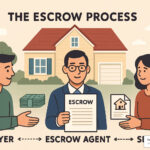Finding Your Perfect Home-Buying Partner
If you need to find buyer’s agent quickly, here’s a quick 5-step process:
- Ask for referrals from friends, family, or your mortgage lender
- Interview 2-3 agents with prepared questions about their experience and approach
- Check credentials (look for ABR or CBR designations and state licensing)
- Verify transaction history through online platforms like Zillow or Realtor.com
- Assess communication style to ensure it matches your preferences
Nearly nine out of 10 buyers work with a real estate agent during their home purchase process. Why? Because the right buyer’s agent can save you time, money, and stress while guiding you through one of the biggest financial decisions of your life.
A buyer’s agent is a licensed professional who works exclusively for you—not the seller. They represent your interests throughout the entire home-buying journey, from initial search to final closing.
“Having someone on your side relieves stress and provides continuous support through the entire purchase,” notes one satisfied homebuyer who found their dream home with professional guidance.
While many buyers rely on personal referrals to find buyer’s agent options (about 43% according to industry data), there are multiple effective strategies for finding the right agent for your specific needs.
The key is finding someone who combines local market expertise, strong negotiation skills, and a communication style that matches yours. In the sections that follow, we’ll break down exactly how to identify, interview, and partner with a buyer’s agent who truly understands your needs.

What Exactly Is a Buyer’s Agent (and How They Differ from Listing Agents)
When you’re diving into the home-buying process, understanding who’s truly in your corner makes all the difference. A buyer’s agent is your personal champion—a licensed real estate professional legally bound to put your interests first throughout your entire home-buying journey.
Think of your buyer’s agent as your dedicated advocate in what can be an emotional and complex process. They’re the person who whispers “maybe we should look at the foundation more closely” when you’re falling in love with a charming but potentially problematic property.
The main distinction between a buyer’s agent and a listing agent comes down to loyalty. Listing agents (also called seller’s agents) work for the seller, aiming to secure the highest possible price and most favorable terms for the property owner. Your buyer’s agent, on the other hand, works exclusively for you, focused on finding your perfect home at the best possible price with terms that benefit you.
As one buyer’s agency cleverly puts it: “Your Protector, Negotiator, Advocate, and Representative—that’s what PNAR stands for. A buyer’s agent is in your corner and will protect you and expertly attain the property you want at the very best price and terms for YOU.”
| Agent Type | Who They Represent | Primary Goal | Commission Source | Potential Conflicts |
|---|---|---|---|---|
| Buyer’s Agent | Buyer only | Best price & terms for buyer | Typically seller (changing) | None if exclusive |
| Listing Agent | Seller only | Highest price & terms for seller | Seller | None |
| Dual Agent | Both buyer & seller | Facilitating transaction | Seller | Significant conflicts |
| Exclusive Buyer’s Agent | Buyers only (never sellers) | Best buyer outcomes | Typically seller or buyer | None |
When searching for representation, you might come across agents with special designations like Accredited Buyer’s Representative (ABR) or Certified Buyer Representative (CBR). These credentials indicate the agent has completed specialized training focused specifically on representing buyers—a definite plus when you’re looking to find buyer’s agent options with deeper expertise.
Why Dual Agency Can Hurt Buyers
Imagine having the same lawyer represent both sides in a court case. Sounds problematic, right? That’s essentially what happens with dual agency, where one agent represents both buyer and seller in the same transaction.
As one industry expert colorfully explains: “Can one real estate agent represent both the buyer and seller? Yes, but it’s like having a lawyer represent both the plaintiff and defendant.”
This arrangement creates an inherent conflict of interest. How can someone genuinely negotiate the lowest price for you while simultaneously trying to get the highest price for the seller? They simply can’t—at least not effectively.
Because of these obvious conflicts, dual agency is completely illegal in eight states: Alaska, Colorado, Florida, Kansas, Maryland, Texas, Vermont, and Wyoming. In other states where it’s permitted, agents must clearly disclose the arrangement and get consent from all parties involved.
If an agent suggests representing both sides of your transaction, consider it a warning sign. Your interests are almost always better served by having someone dedicated solely to your needs. You can learn more about the legal details of dual agency at Zillow Group’s advocacy site.
Exclusive Buyer’s Agents: The Gold Standard
For the ultimate in buyer protection, exclusive buyer’s agents offer a level of dedicated service that’s hard to beat. These specialists work exclusively with buyers and never take listings from sellers, completely eliminating potential conflicts of interest.
“Exclusive buyer agents are more highly specialized and razor-focused on spending time and resources only with buyers to find them their dream home,” explains one industry expert.
Many of these professionals belong to the National Association of Exclusive Buyer Agents (NAEBA) and follow strict ethical standards. Their singular focus on buyer representation typically means they offer:
- Deeper expertise in evaluating properties through a buyer’s lens
- Stronger negotiation skills specifically honed for buyer-side transactions
- Freedom from pressure to show in-house listings or higher-commission properties
- Access to off-market opportunities through their extensive professional networks
- Complete loyalty without company pressure to represent both sides of a deal
The difference is tangible, as one first-time buyer shared: “Working with an exclusive buyer’s agent made the process fun and pressure-free. They were completely focused on finding us the right home, not just making a sale.”
When you’re ready to find buyer’s agent options, considering an exclusive buyer’s agent might give you the highest level of dedicated service and peace of mind throughout your home-buying journey.
Why Hire a Buyer’s Agent & How Commissions Work
Buying a home isn’t just another purchase—it’s likely the biggest financial decision you’ll ever make. Having a dedicated buyer’s agent in your corner can make all the difference in this journey.
Think of your buyer’s agent as your personal home-buying guide, equipped with insider knowledge and skills that can save you significant time, money, and stress. They bring negotiation power that often recovers more than their commission through strategic offers and favorable contract terms. Their deep market expertise helps you understand true neighborhood values and spot potential issues that might not be obvious during a casual viewing.
“My agent pointed out water damage that I completely missed during our first showing,” shares Maria, a recent first-time buyer. “That saved me from a $15,000 repair I would have finded only after closing.”
Your agent’s full access to the Multiple Listing Service (MLS) gives you an edge with property details not available on public websites and early access to coming-soon listings. This professional filtering saves you countless hours that would otherwise be spent touring homes that don’t actually meet your needs.
Most importantly, your buyer’s agent has a legal fiduciary duty to put your interests first, providing protection and guidance that prevents costly mistakes throughout the process.

For decades, real estate commissions have typically ranged from 5-6% of the sale price, split between the listing agent and buyer’s agent (usually 2.5-3% each). Traditionally, sellers have covered the full commission from their proceeds, which is then divided between both agents.
However, this structure is evolving following the 2023 National Association of Realtors (NAR) settlement. Now, buyer’s agent commissions must be negotiated separately, and in some cases, buyers may need to pay their agent directly.
“One thing many people don’t realize is that commissions have always been negotiable,” explains Tom, a veteran real estate broker. “They’re not set by law, despite common misconceptions.” This means you can—and should—discuss fee structures with potential agents before signing any agreement.
Typical Services You Should Expect
A quality buyer’s agent earns their commission by providing comprehensive support throughout your entire home-buying journey.
Your agent should handle everything from property search and selection to scheduling and accompanying you on home tours. They’ll analyze comparable properties to determine fair market value before you make any offer, then develop strategies around price, contingencies, and terms to create offers that stand out in competitive markets.
Their negotiation skills represent your interests not just in the initial offer but through inspection results, appraisal issues, and final contract terms. They’ll coordinate your due diligence process by arranging inspections, appraisals, and other necessary evaluations while ensuring all contract deadlines are met properly.
“My agent’s network was invaluable,” recalls James, who purchased his first home last year. “She connected us with a lender who found us a better rate than we’d found ourselves, plus an inspector who identified issues the seller ultimately fixed before closing.”
Your agent should guide you through the closing process and attend the final signing to represent your interests until the keys are in your hand. These comprehensive services create a smoother, less stressful buying experience from start to finish.
Cost Myths Busted
Let’s clear up some common misconceptions about working with a buyer’s agent:
Despite what you might hear, using a buyer’s agent typically doesn’t cost buyers additional money. Even with recent industry changes, many sellers still offer compensation to buyer’s agents from their proceeds. Your agent can explain the specific compensation structure for properties you’re considering.
Some buyers mistakenly believe they’ll get a better deal by working directly with the listing agent. In reality, any discount from “double-ending” the deal usually benefits the agent more than you. Without dedicated representation, you might actually pay more through weaker negotiation or overlooked property issues.
While discount or rebate agents can sometimes offer good value, be careful to understand exactly what services are included before choosing based on price alone. As the saying goes, you often get what you pay for.
Perhaps the biggest myth is that buyers can negotiate better prices without an agent. The truth? Professional buyers’ agents typically save clients more than their commission through market knowledge and negotiation expertise. They know which properties are truly overpriced and which repair requests sellers are likely to accept.
“The commission structure is changing,” notes a real estate educator, “but the value of dedicated buyer representation remains constant. A skilled agent’s negotiation can save you far more than their fee—not to mention the peace of mind that comes from having an expert guide you through one of life’s biggest transactions.”
How to Find Buyer’s Agent Step-by-Step
Ready to start your home buying journey? Finding the right buyer’s agent is like finding a trusted guide for an important trip. Let’s walk through how to connect with someone who’ll truly have your back throughout the process.
1. Define Your Needs and Preferences
Before diving into your agent search, take a moment to get clear about what you’re looking for. Think about which neighborhoods you’re targeting, what your budget looks like, when you hope to move, and which home features are absolute must-haves versus nice-to-haves. Also consider how you prefer to communicate—are you a texter, emailer, or phone call person?
Knowing these details upfront helps you find someone who matches not just your home needs, but also your working style.
2. Ask for Personal Referrals
There’s nothing quite like a personal recommendation when you need to find buyer’s agent candidates. In fact, about 51% of first-time buyers connect with their agents through friends, family, or neighbors.
Your mortgage lender can be another goldmine for agent referrals. Loan officers know which agents consistently steer transactions smoothly and which ones might cause headaches. Similarly, real estate attorneys, home inspectors, and appraisers often have the inside scoop on agents with stellar reputations.
As one happy homeowner shared, “My friend recommended her agent, and it was the best decision we made. She knew exactly what questions to ask that we hadn’t even thought of!”
3. Attend Open Houses
Open houses aren’t just for serious property shoppers—they’re perfect opportunities to meet agents in their natural habitat. Pay attention to how they interact with visitors, how knowledgeable they seem about the neighborhood, and whether they follow up professionally afterward.
“When I get hungry, I do an open,” one agent joked, highlighting how these events bring agents and potential clients together. Take business cards from agents who impress you, and don’t be shy about asking questions to gauge their expertise.
4. Research Online Presence and Reviews
A thorough online investigation can reveal volumes about an agent’s reputation and style. Check reviews on Zillow, Realtor.com, and Google, watching for patterns in feedback. Does everyone mention their amazing negotiation skills? Or do you see repeated concerns about responsiveness?
Many agents now create YouTube content showcasing their market knowledge. These videos can give you a feel for their personality and expertise before you ever meet in person. Their social media accounts can also provide insights into their communication style and market understanding.
5. Use Agent-Matching Services
Several platforms now use sophisticated algorithms to connect buyers with agents based on transaction history, specialization, and client reviews. These services typically pre-screen agents and may even negotiate reduced commissions.
“Great service, helped me make sense of a complicated process and recommended someone who did really well by us,” reported one buyer who used a matching service. The best part? These services are usually free for buyers since agents pay the referral fees.
6. Check Local Brokerages
Sometimes the direct approach works best. Contact reputable local brokerages and ask to speak with the managing broker about your specific needs. Request introductions to their top buyer specialists, particularly those who focus on your target neighborhoods or property types.
7. Drive Through Target Neighborhoods
Don’t underestimate good old-fashioned legwork! Spending time in your desired neighborhoods can yield valuable insights. Notice which agents have multiple listings in the area (suggesting local expertise) and look for those “SOLD” signs that indicate successful transactions.
Local coffee shops, restaurants, and businesses can also be surprising sources of agent recommendations. The barista who knows everyone might just connect you with the neighborhood’s most trusted agent.

Quick Checklist to Find Buyer’s Agent Online
When searching online to find buyer’s agent candidates, keep an eye out for these key indicators of quality:
Look at their transaction volume to ensure they regularly close deals in your price range and target areas. Test their responsiveness by sending an inquiry and seeing how quickly they get back to you. Verify they have experience with your specific needs, whether you’re a first-time buyer, looking for luxury properties, or hunting for investment opportunities.
A professional website and active social media presence usually signal a tech-savvy agent who accepts modern marketing techniques. Pay special attention to client testimonials that mention specific strengths like negotiation skills or problem-solving abilities. Finally, check for buyer-specific credentials like ABR (Accredited Buyer’s Representative) or CBR (Certified Buyer Representative).
“Use YouTube videos created by local agents to judge their market knowledge and presentation skills,” suggests one industry expert. This approach lets you get a feel for their expertise before committing to a meeting.
Tools & Tech to Find Buyer’s Agent When Relocating
Moving to a new city adds another layer of complexity when trying to find buyer’s agent support. Thankfully, technology offers several solutions to bridge the distance gap.
Virtual interviews make it possible to meet potential agents face-to-face, even from thousands of miles away. Some agents specialize as relocation specialists, offering comprehensive resources about neighborhoods, schools, and local amenities to help your transition.
Apps like NeighborhoodScout or AreaVibes can help you research areas remotely before connecting with local agents. Agent-matching platforms become especially valuable when you lack local connections in your new city.
Tech-savvy agents can provide video tours of properties and neighborhoods, saving you time and travel expenses. As one relocating buyer shared, “Our agent walked through potential homes on FaceTime before we flew in. We saw seven homes in person and made an offer on our favorite—all in one weekend trip!”
For more comprehensive guidance on the entire home buying process, check out our First-Time Homebuyers Toolkit: Everything You Need to Know Before You Buy.
Screening & Interviewing Buyer’s Agents Like a Pro
You’ve gathered a list of potential agents, but now comes the crucial part—finding the perfect match for your home buying journey. Most real estate experts suggest interviewing at least 2-3 agents before making your final decision.
“It is very smart to carefully interview and select the best buyer’s agent for this major financial transaction,” as one buyers’ association wisely puts it.
Think of these interviews as dating before marriage—you’re looking for someone who’ll guide you through one of life’s biggest financial commitments. Let’s break down what to focus on during this “getting to know you” phase.
1. Experience and Expertise
When you sit down with a potential agent, dig into their real-world experience. Aim for someone with at least 2-3 years of active selling experience—they’ve weathered different market conditions and faced various challenges.
A sweet spot is an agent handling around 15-20 transactions annually. Too few might indicate inexperience, while too many could mean you’ll get less personal attention. Ask about their buyer-to-seller ratio—an agent who primarily works with sellers might not have the buyer-focused skills you need.
Pay special attention to their familiarity with your target neighborhoods. A good buyer’s agent should light up when discussing your preferred areas, sharing insights about school districts, development plans, or even which streets tend to have drainage issues after heavy rain.
“My agent knew which builders had the best reputation in our neighborhood and steered us away from homes with potential foundation issues common in that area,” shared one happy homebuyer. “That kind of local expertise is priceless.”
2. Professional Credentials
Credentials matter, but the right ones matter more. For buyer representation specifically, look for designations like ABR (Accredited Buyer’s Representative), CBR (Certified Buyer Representative), or CEBA (Certified Exclusive Buyer Agent).
Don’t just take their word for it—verify their licensing status through your state’s real estate commission website. While you’re there, check if they’ve had any disciplinary actions or complaints filed against them.
Membership in professional organizations like the National Association of REALTORS® (NAR) or the National Association of Exclusive Buyer Agents (NAEBA) indicates a commitment to professional standards and ongoing education.
3. Working Style and Availability
Your dream agent won’t do you much good if they’re too busy to answer your calls or show you properties. Ask directly about their current client load and typical response time.
Be clear about your own availability too. If you can only view homes on evenings and weekends, make sure your agent can accommodate that schedule.
Also clarify who you’ll be working with. Some busy agents have teams where you might be handed off to junior associates after the initial meeting. That can work well, but you should know upfront what to expect.
“I thought I was hiring Jane, but mostly worked with her assistant Tom. He was great, but I wish I’d known that from the beginning,” one buyer shared.
4. Contract Terms and Conditions
The buyer agency agreement is essentially your prenup—it sets expectations and outlines what happens if things don’t work out. Don’t gloss over this part!
With recent industry changes to commission structures, be especially clear about who pays your agent and how much. Ask about the length of the agreement—shorter terms (30-60 days) give you more flexibility if the relationship isn’t working.
Look for reasonable termination clauses that allow you to part ways if you’re unhappy with the service. Some contracts cover specific geographic areas or property types, so make sure those align with your search parameters.

Must-Ask Interview Questions
When you sit down for that interview (virtual or in-person), come prepared with questions that reveal the agent’s approach and values. Here are ten essential questions to include:
“How many buyers are you currently representing, and how many did you help purchase homes last year?” Their answer reveals both experience level and whether they have capacity for you.
“What neighborhoods do you specialize in, and how long have you worked in those areas?” Listen for specific details that demonstrate genuine local expertise.
“Can you share examples of how you’ve helped buyers win in competitive situations?” This reveals their negotiation skills and creative problem-solving abilities.
“What’s your policy on dual agency, and how do you handle it if it comes up?” Their answer speaks volumes about their ethical standards and commitment to your interests.
“With recent changes in commission structures, how are you handling buyer agent compensation?” This shows transparency about costs and adaptability to industry changes.
As one savvy homebuyer explained, “I ask these questions because I’m trying to find somebody who is going to listen to my wants and needs more than just try to talk over me and just state how good they are.”
Vetting Credentials & Reputation
Trust but verify—that’s the motto when it comes to agent credentials. Here’s how to do your due diligence:
First, check their licensing status on your state’s real estate commission website. This official source will confirm they’re legally allowed to practice and reveal any disciplinary history.
Next, verify their transaction history. While platforms like Zillow and Realtor.com don’t show everything, they can give you a sense of recent sales activity and client reviews.
Don’t skip contacting references. Speaking with past clients gives insights no website can provide. Ask about communication style, negotiation skills, and whether they’d use the agent again.
According to the latest NAR Home Buyers Report, buyers value experience, reputation, honesty, and trustworthiness above all other agent qualities. Taking time to verify these traits isn’t being paranoid—it’s being prudent.
Personality & Communication Fit
Beyond credentials and experience lies perhaps the most important factor—can you work comfortably with this person? You’ll spend significant time together during your home search, often in stressful situations.
Pay attention to how they communicate during your interview. Do they dominate the conversation or listen attentively? Do they explain concepts clearly without talking down to you? Do they seem patient with your questions?
Notice your gut feeling too. Do you feel comfortable around them? Do they seem genuinely interested in helping you achieve your goals?
“It’s critical that you find somebody who is going to listen to your wants and needs,” emphasizes one industry expert. “This relationship will involve significant time together and important decisions—personal compatibility matters.”
The best buyer’s agent for you combines professional expertise with a communication style that makes you feel heard, understood, and supported throughout your home buying journey. Take the time to find this person—your future self will thank you.
Red Flags, Contracts, and Getting Out Gracefully
Finding the right buyer’s agent is a bit like dating – sometimes you need to recognize the warning signs before you commit. As you interview potential agents, keep an eye out for behaviors that might signal trouble ahead.
Red Flags When Interviewing Agents
Have you ever felt pressured into making a quick decision? That’s exactly what you should watch for when meeting potential agents. Quality professionals understand you’re interviewing multiple candidates and won’t push you to sign immediately.
“When I called three agents, only one picked up the phone. That immediate responsiveness told me everything I needed to know about who would be available when I needed them,” shared one homebuyer who used phone response as an initial screening tool.
Be wary of agents who give vague answers about their experience or hesitate to provide specific transaction numbers. Similarly, an agent who seems enthusiastic about dual agency might not have your best interests at heart. Dual agency creates inherent conflicts – you want someone focused solely on your needs.
Poor responsiveness during initial contacts often predicts future communication problems. If they can’t respond promptly when trying to win your business, imagine how they’ll behave once they have it!
Other concerning behaviors include dismissing your concerns, making unrealistic promises about outcomes in unpredictable markets, displaying limited knowledge about your target neighborhoods, or focusing conversations around their commission rather than your needs.
Understanding Buyer Agency Agreements
Most buyer’s agents will ask you to sign a formal agreement that establishes your working relationship. Think of it as the rulebook for how you’ll work together.
This document typically covers several important elements:
– Exclusivity: Whether you’re committed to working only with this agent
– Duration: How long the agreement lasts (shorter terms give you more flexibility)
– Geographic area: The specific locations where the agent will represent you
– Property types: What kinds of homes or properties are included
– Compensation: How your agent will get paid and who’s responsible
– Termination provisions: Your exit options if things don’t work out
“It’s worth asking for a trial opt-out period in the contract,” advises one industry expert. “Although some agents may refuse, many will agree to a 30- or 60-day trial period.”

Key Clauses to Include in Your Buyer Agency Agreement
When reviewing your agreement, consider negotiating some buyer-friendly additions to protect yourself. A reasonable agent should be open to discussing these terms.
First, try to include a 30-day trial period that allows either party to walk away without penalty. This gives you time to see if the relationship works in practice, not just on paper.
Clear performance expectations are also valuable – what specific services should the agent provide? Will they send weekly property updates? How quickly will they schedule showings when you find a property of interest?
Communication requirements matter too. Some buyers prefer texts, others emails or calls. Your agreement can specify expected response times for your preferred methods.
Termination rights should be crystal clear. Under what conditions can you end the agreement without penalty? And speaking of penalties, make sure the commission structure is transparent, especially given recent industry changes.
Some confident agents even offer satisfaction guarantees that give you unconditional termination rights if you’re unhappy with their service.

If you find yourself needing to end a relationship with an agent, there’s a graceful way to handle it. Start by reviewing your contract to understand your termination rights and any potential penalties. Then have a direct, professional conversation explaining your specific concerns.
Always follow up with written confirmation of termination according to your contract terms. If you encounter resistance, don’t hesitate to contact the managing broker of the agency – they can often help mediate the situation.
“You can terminate the agreement per its terms—often after it expires or by invoking a performance-based clause—though some agreements automatically renew,” notes one real estate source.
Finally, use what you’ve learned from the experience to find a better fit next time. Every relationship, even unsuccessful ones, teaches us something about what we truly need in a buyer’s agent.
Frequently Asked Questions about Finding a Buyer’s Agent
How many agents should I interview?
Most real estate experts suggest talking with at least 2-3 agents before making your decision. This sweet spot gives you enough perspective to compare styles and approaches without getting overwhelmed by too many options.
“I interviewed three agents and was amazed at how different each one was,” shares Maria, a recent first-time homebuyer. “The third one just clicked with my communication style in a way I wouldn’t have recognized if I hadn’t met the others first.”
Interestingly, industry data shows that 81% of sellers contact only one agent before signing a contract. This suggests many buyers might be settling too quickly rather than finding their ideal match. Taking time for a few conversations can dramatically improve your home buying experience.
Can I switch agents mid-search?
Yes, you absolutely can switch agents during your home search, but how smoothly this goes depends on your paperwork situation:
If you haven’t signed a buyer agency agreement, you’re free to make a change whenever you want. No strings attached!
If you have signed an agreement, you’ll need to follow the termination provisions outlined in your contract. This might mean waiting for the term to expire, negotiating a mutual release, or using an exit clause if you were smart enough to include one.
Professional courtesy matters here. If an agent has invested significant time showing you properties and providing market analysis, a straightforward conversation about why you’re considering a change is the respectful approach. Sometimes these discussions even resolve the issues that made you want to switch in the first place!
“I was unhappy with my agent’s responsiveness, but after a heart-to-heart conversation about my expectations, things improved dramatically,” explains James, who almost switched agents three months into his home search. “I’m glad I spoke up rather than just disappearing.”
If your current agent isn’t cooperative about releasing you from your agreement, reaching out to their managing broker can often help resolve the situation amicably.
What happens if the seller refuses to pay my agent’s commission?
With recent changes in the real estate industry, this scenario is becoming more common than ever before. If you encounter a seller who won’t cover your buyer’s agent’s commission, you have several options:
Negotiate with the seller – Your agent might convince the seller that their expertise will actually make the transaction smoother and potentially even save the seller money in the long run.
Cover the commission yourself – You might need to pay your agent directly out of pocket. This would be an additional expense beyond your down payment and closing costs.
Work out a reduced fee – Many agents would rather accept a lower commission than lose the deal entirely, especially if they’ve invested significant time with you.
Build it into your offer – You could increase your offer price to effectively cover the commission, though this affects your loan amount and monthly payments.
Reconsider the purchase – If the numbers don’t work when factoring in agent costs, this might not be the right property for your financial situation.
“The most important thing is understanding your potential financial responsibility before you start house hunting,” advises veteran agent Carlos Martinez. “Have an upfront conversation with your buyer’s agent about various commission scenarios and how they’d handle each one.”
The changing commission landscape makes it more important than ever to discuss compensation structures with potential agents during your interview process. A transparent agent will walk you through all possibilities before you sign anything.
Conclusion
Finding the right buyer’s agent is truly a cornerstone of your home-buying journey. The perfect agent doesn’t simply connect you with properties—they become your dedicated champion, trusted advisor, and skilled negotiator throughout what might be one of the most significant financial decisions of your life.
As we’ve explored throughout this guide, the relationship you build with your agent can make all the difference between a stressful experience and a successful, even enjoyable one. Take these insights with you as you begin your search:
First and foremost, take your time with this important decision. Rushing to partner with the first agent you meet could mean missing out on someone who better understands your unique needs and communication style. Those extra interviews can reveal surprising differences in approach and expertise.
Always verify credentials before moving forward. A quick check of licensing status, transaction history, and a conversation with past clients can save tremendous headaches down the road. As one of our readers shared, “The twenty minutes I spent calling references saved me months of frustration.”
Don’t underestimate the power of trusting your instincts. The right agent should make you feel comfortable asking questions and never make you feel rushed or dismissed. This person will be by your side during emotional decisions—chemistry matters.
Make sure you thoroughly understand the agreement you’re signing. Knowledge is power, and negotiating buyer-friendly terms in your agency contract creates a foundation for a balanced working relationship.
Finally, remember to value expertise over cost savings. A skilled agent’s negotiation abilities and in-depth market knowledge typically save you far more than their commission costs—both financially and emotionally.
At Your Guide to Real Estate, we’re passionate believers that informed buyers make confident, successful decisions. The right buyer’s agent transforms your home-buying journey, guiding you through complexities and standing firmly in your corner at every turn.
“Finding an agent who truly understood what we were looking for made all the difference,” one satisfied homebuyer told us recently. “They didn’t just find us a house—they found us our home, and made the journey there almost as rewarding as the destination.”
Ready to take the next step with confidence? Our First-Time Homebuyers Toolkit: Everything You Need to Know Before You Buy provides additional resources to guide you through the entire home-buying process with clarity and assurance.
The ultimate goal isn’t simply to find buyer’s agent listings—it’s to find a trusted partner who will guide you to a successful purchase that not only meets your needs today but supports your dreams for tomorrow. With the right agent by your side, your home-buying story can have the happy ending you deserve.





















